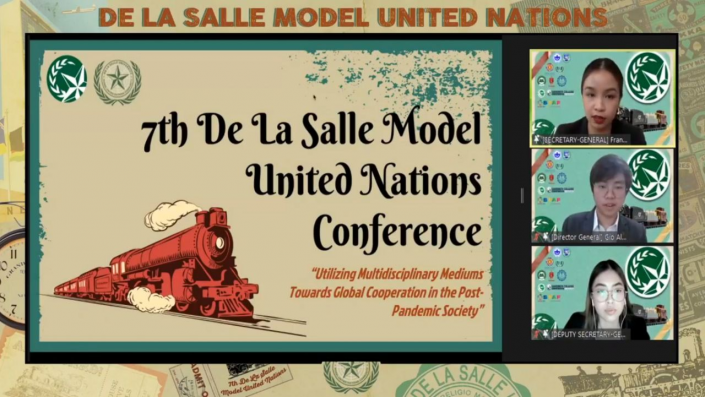
The biggest Model United Nations (MUN) in the country gathered more than 300 local and international delegates for its two-day online conference held last May 8 to 9.
This was preceded by several panel discussions, a delegate’s workshop, and a socials night in the months leading up to the event. With the theme “Utilizing Multidisciplinary Mediums Towards Global Cooperation in the Post-Pandemic Society”, DLS-MUN’s flagship conference simulated meetings from different UN committees to challenge their participants to create forward-thinking solutions through diplomacy and international solidarity.
Roadmap for the future
The post-pandemic world would bring with it a host of complex global challenges for the youth. Secretary-General Francesca Castro emphasized in her opening remarks that this year’s online setting only maximized the conference’s potential by “reaching further across nations.” Far from being an event where delegates just play make-believe, Castro asserted that the DLS-MUN is a platform where delegates can ignite their passion for advocacies and development. “This is where we could spark discourse and dialogue among a very diverse group of people,” she added.
Antonio Guterres, Secretary-General of the United Nations (UN), also penned a letter for the delegates, which was subsequently read in the opening session by Deputy Secretary-General Audrey Garin. “The pandemic has created a moment for change […] recovery is our chance to shape a better future,” he wrote, “Thank you for your belief in the power of dialogue and cooperation to meet the tests of our time.”
Another message, this time a prerecorded video from Vice President Maria Leonor “Leni” Robredo, capped off the momentous session. “As youth leaders and participants of this event, you are in the unique position to amplify the voices of your peers,” she remarked. The Vice President went on to encourage the delegates to be global changemakers, saying, “You are never too young to make a difference.”
Widening the discourse
Various committee sessions were held during the two days, simulating the processes of real-life UN councils such as the UN Security Council, the World Health Organization (WHO), the UN Conference On Trade And Development, the UN Human Rights Council (UNHRC), the UN Environmental Programme, and the UN Food and Agricultural Organization. These sessions tackled two topics each, ranging from the global distribution of the COVID-19 vaccine, tourism, education, to food security.
Three chosen proposed resolutions from the delegates who attended these committee sessions were then presented during the Plenary. A resolution for Providing Equitable Access to Off-site Education for Students Amidst the Pandemic was presented by delegates from The Argentine Republic, The Republic of Côte d’Ivoire, and The Republic of Fiji, who sponsored the resolution. This proposal by the UNHRC aimed to provide educational resources to remote areas for inclusive learning and was passed with overwhelming support.
The second resolution was from the WHO and sponsored by delegates from the French Republic, People’s Republic of China, State of Israel, and the Kingdom of Thailand. The proposal was titled Multilateral Partnerships with Healthcare Systems Towards Global Recovery from COVID-19 and aimed to foster multi-sectoral and multilateral cooperation for post-pandemic recovery and passed with 109 votes.
The last proposal tackled The Myanmar Crisis sponsored by delegates of The Swiss Confederation and The United States of America during the UNSC committee session. The resolution sought to address the Rohingya refugee crisis and Myanmar’s peace and security. Garnering 65 votes in favor and 46 votes against, the motion did not pass.
Imagining a better world
As the event came to a close, human rights lawyer Atty. Jose Manuel “Chel” Diokno gave a rousing speech that examined the state of our country amid the pandemic. He highlighted the importance of the government’s commitment to upholding universal human rights in the wake of the pandemic.
Moreover, he also urged for good governance and evidence-based public health solutions to mitigate the pandemic and its socioeconomic effects, saying, “If we want to ensure our right to health—individually and collectively—we have to have the right practices in institutions.” These practices would include stringent contact tracing, mass testing, and efficient vaccine rollout plans.
It is also crucial that we do not only tackle issues of health during these times but also how access to education has been severely paralyzed. Diokno praised the Filipino youth for launching the campaign #NoStudentLeftBehind, deeming it as a call for a more inclusive education system.
This, he urged, is all the more reason why the youth has the power to determine our future. Through collective action, we can strive to ensure that each and every individual’s inherent human rights are being upheld. Diokno drives home this point by saying, “We can live […] we can survive without human rights, but that’s not the life we deserve as human beings.”
